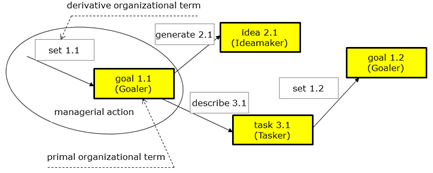So far, I have presented three approaches to representing the work of a manager that are developing in parallel: managerial skills, managerial roles and management styles. Each of these approaches represented the manager from a different angle. But none provided an opportunity for us to answer the question – what does a manager actually do? What are the activities that he or she undertakes one after another?
Managerial skills represented what a manager should be able to do. Managerial roles brought together groups of activities, but without any details. And management styles give some general picture as to the nature of a manager’s behavior. And nothing more.
So we need a different approach to determine the specific managerial activities that a robotic manager can do and their sequence in a certain business situation. Of course, business situations are never even similar, usually so many factors change that, for example, two seemingly identical promotional campaigns or two seemingly identical training projects are never executed in the same way. However, sometimes a way of doing things can be standardized so much that if you could replicate it, a robot manager would have a pretty good track record of leading a team or managing a project.
So let’s define managerial action. Managerial action is a real activity, which a manager does in order to play a managerial role when he has a certain managerial skill. This activity usually falls within a certain general characteristic, which is a managerial style.
Therefore in order to achieve a precise and coherent view of teamwork which could be efficiently used in team management automation, it comes a challenge, how to represent a succession of different types of managerial actions one after another done by a team manager. The pioneering answer to this challenge is the system of organizational terms, which is a complex of ontological and epistemological aspects designed for managerial action patterns research [1, 2, 3].
Managerial action joined a process as a derivative organizational term and a resource as a primal organizational term into a term “managerial action” [4] (Figure 1).

Figure 1. Fundamental structure of managerial actions
My research shows that if we use such a representation of a manager’s work, it is possible to answer the question of what the studied manager did and in what order. Thus, we will be able to imitate him!
For example, in Figure 2 there is a real histogram of managerial actions taken by a human manager obtained in one of the experiments I conducted. I will describe more about this type of research and online managerial tools at TransistorsHead (http://transistorshead.com/) in future blog posts.
To understand Figure 2, just remember that the type of managerial actions means as it follows: 1 – set goals (GOALS), 2 – describe tasks (TASKS), 3 – generate ideas (IDEAS), 4 – specify ideas (SPECIFICATIONS), 5 – create options (OPTIONS), 6 – choose options (DECISIONS), 7 – check motivation (MOTIVATION), 8 – solve conflicts (CONFLICTS), 9 – prepare meetings (MEETINGS), 10 – explain problems (PROBLEMS).

Figure 2. Real managerial actions taken a human manager
As you can see, managerial action is a very effective concept for representing the work of a human manager, so that he can later be replaced by a robot manager. How to do it in practice? Read in the next posts!
Bibliography:
[1] Flak, O. (2013). Theoretical foundation for managers’ behavior analysis by graph-based pattern matching. International Journal of Contemporary Management, 12(4), 110-123.
[2] Flak, O. (2018). Układ wielkości organizacyjnych. Koncepcja metodologiczna badania rzeczywistości organizacyjnej. Katowice: Wydawnictwo Uniwersytetu Śląskiego, ISBN 978-83-226-3322-9
[3] Flak, O. (2020). System of organizational terms as a methodological concept in replacing human managers with robots. In: Advances in information and communication. Proceedings of the 2019 Future of Information and Communication Conference (FICC), 471-500.
[4] Yang, C., Flak, O., & Grzegorzek, M. (2018). Representation and Matching of Team Managers: An Experimental Research. IEEE Transactions on Computational Social Systems, 5(2), 311-323.

